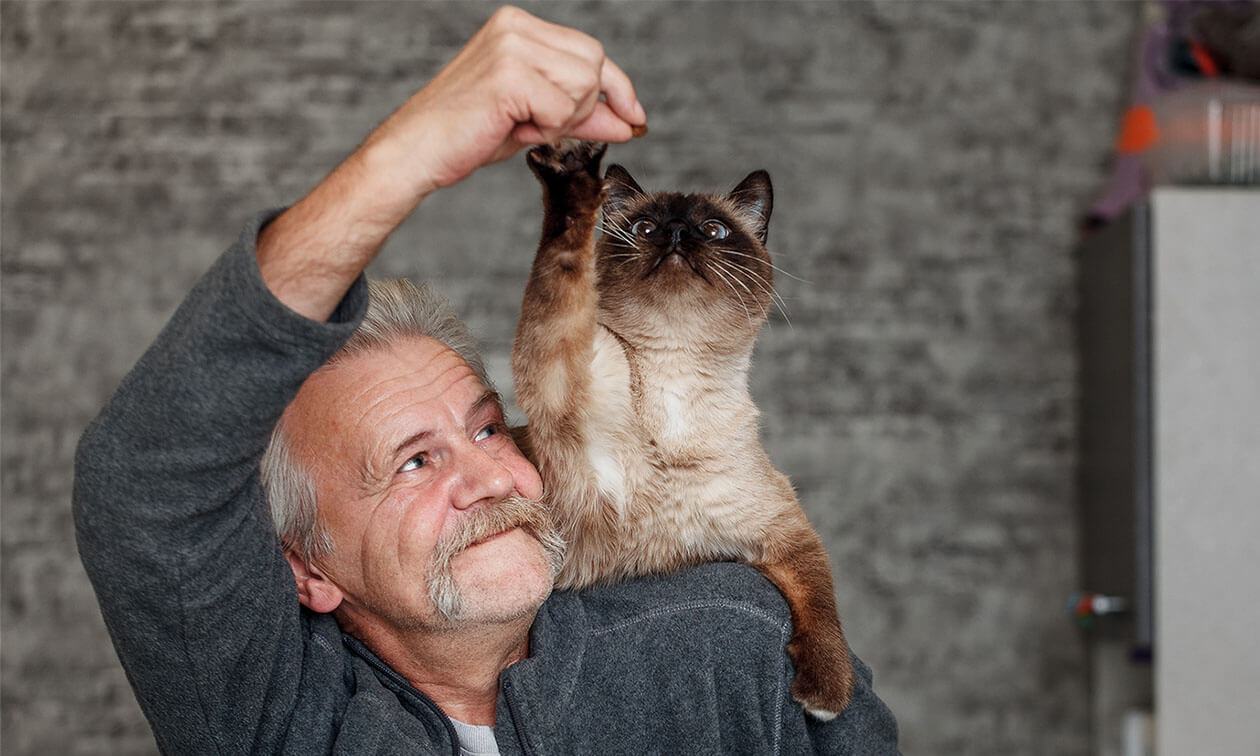Having a cat is a longtime commitment. Some cats make it to their twenties, which is pretty incredible1. Still, that may not feel like enough time with your furry family member. That’s why we’re looking at the longest living cat breeds.
Here are some of the cat breeds that often live more than 15 years2.
Japanese Bobtail
The Japanese Bobtail can be any solid color, shade, or pattern and have a distinctive bob tail, which may contribute to back issues. These cats can be a bit demanding, but they’re also affectionate, playful, and smart. They’re not afraid to let you know when they need attention and can be quite chatty. This breed is generally healthy and not prone to genetic health issues. Japanese Bobtails can live up to 18 years.
Balinese
The Balinese has bright blue eyes, close together. Their coat is medium length and usually either seal point, chocolate point, lilac point, or blue point in color. These are outgoing, smart cats who like affection and need to keep their brains active. They can live up to 18 years, but are prone to some health issues, including eye problems, dental disease, and amyloidosis.
Domestic Shorthair
The Domestic Shorthair cat is amongst the longest living cat breeds because they are a mixed breed animal. Mixed cat breeds can be the healthiest because their combined qualities tend to be the best ones stemming from several breeds, allowing them to potentially lead long, healthy lives.
Burmese
While the average lifespan for a Burmese is 12 to 16 years, they can live up to 25 years. These are family-oriented cats who love to love. They’re also highly intelligent, so mental enrichment is a must. There are two types, the American Burmese and European Burmese. The coat is very short and fine, colored in sable, platinum, blue, or champagne. This breed is generally healthy, but one condition, called feline orofacial pain syndrome (FOPS), is more commonly reported in Burmese cats than other breeds.
Cornish Rex
The Cornish Rex is another cat with a unique look. They have long, slim bodies, very short hair that’s tightly curled, and extremely large ears. These cats are friendly and want to be where the action is. They do require some special care when it comes to grooming and because of their thin coat, require extra care to stay warm. They often live 16 to 20 years. Cornish Rexes are more prone to a genetic vision condition called progressive retinal atrophy, but with the right care, this condition shouldn’t affect their lifespan.
Bombay
Bombay cats have a stunning, short, black coat, and most have round, copper eyes. They’re great family cats who love to make friends with everyone. They’ve been known to live up to 20 years. Fortunately, this breed isn’t prone to genetic health issues.
Siamese
Siamese are considered one of the most talkative breeds. They love to chat. They’re playful and extremely intelligent. If you don’t give them something to do, they’ll find it on their own. These short-haired cats are long and thin with very large ears. They can live up to 20 years, but are prone to several health issues, like pica, asthma, and amyloidosis.
Ragdoll
Ragdolls are gorgeous, with large blue eyes and a variety of coat colors and patterns. Most have a mask of color on their faces. These cats are all about snuggles, and many enjoy water. Ragdolls are often compared to dogs when it comes to personality. This breed has a lifespan of between 15 and 25 years. Due to their size, they are prone to obesity and arthritis.
What You Can Do to Help Your Cat Live Longer
No matter their breed or breed mix, there are some things you can do to help your cat live a long and healthy life.
- Regular veterinary care
- Maintaining an ideal weight and feeding a healthy diet
- Keep your cat indoors
- Physical activity
- Spay and neuter
- Hydration
- Dental care
Every cat is different. There are many factors that determine how long a cat will live, so lifespan numbers aren’t a guarantee. Life expectancy for cats is an estimation based on historical data. Whether a cat is kept indoors or outdoors, the quality of their veterinary care, genetics, and more can have an impact. Having said that, cats that live the longest tend to be indoor cats, living between 13 and 17 years1. Outdoor cats, on the other hand, tend to live about half as long4.
ZPC-04246
- How Long Do Cats Live? Cat Lifespan Explained. Forbes Advisor. https://www.forbes.com/advisor/pet-insurance/pet-care/how-long-do-cats-live/. Accessed February 20, 2025.
- How Long Do Cats Live? Here’s What to Expect. PetMD. https://www.petmd.com/cat/care/how-long-do-cats-live. Accessed February 20, 2025.
- 25 Cat Breeds with the Longest Lifespan. Newsweek. https://www.newsweek.com/cat-breeds-longest-life-spans-1583448. Accessed February 20, 2025.
- Genetics: Maine Coon Cat Hypertrophic Cardiomyopathy (HCM). NC Veterinary Hospital. https://hospital.cvm.ncsu.edu/services/small-animals/genetics/maine-coon-cat-hypertrophic-cardiomyopathy-hcm/. Accessed February 20, 2025.



